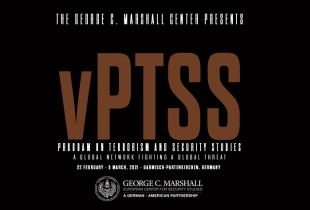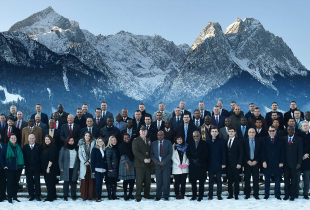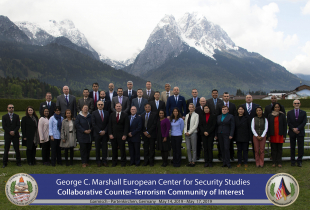
Arduous Journey Doesn’t Detract Alumnus from Sharing Counterterrorism Strategy
By James Brooks
Public Affairs Office
George C. Marshall European Center for Security Studies
GARMISCH-PARTENKIRCHEN, Germany (July 21, 2016) - The distance between Manila and Garmisch Partenkirchen, Germany is more than 6300 miles. There are no direct flights between the Pacific capital and Munich International Airport. That's a 17-hour plane flight with at least one connection. For even the most seasoned traveler, it's not an easy trip. The journey will take an entire day when airport connections are made and all flights run on time.
But twice a year for the past several years, Emmanuel Bautista, executive director of the Cabinet Cluster on security, justice, and peace at the Office of the President of the Philippines and former chief of staff of the armed forces of the Philippines, makes that arduous trip. He does it to deliver his vision of combatting global terrorism at the George C. Marshall European Center for Security Studies to an international group of government and military officials. Bautista is also a Marshall Center alumnus who attended the Senior Executive Seminar in the summer of 2015.
"This is an opportunity to share our experiences in combatting terrorism and I see it as an obligation not only to share but also learn from the questions the participants throw at me. I keep sharing our experiences in 'bayanihan'--that's collective community work. Bayanihan works on the basis of knowing the members of your community and the Philippines propose a global concept of bayanihan because there are issues like terrorism that we need to address collectively as nations. This is something now we can introduce here to each other and perhaps move on from there," said Bautista.
Bautista knows the value of the four-week Program on Terrorism and Security Studies (PTSS) resident course held twice a year at the Marshall Center. There isn't another program that pulls together civilian, law enforcement, and military counterterrorism professionals from around the world to improve their capacity to deal with the transnational implications of the threat.
PTSS program director James Howcroft admires the tenacity and commitment of his guest speakers who share their experience. But Bautista's dedication serves as a type of gold standard among experts.
"The United States and the Philippines have a security relationship that goes back generations. General Bautista making the effort to travel to the Marshall Center to share his country's experience is a concrete example of the great support America has always received from one of our most valuable and trusted allies. The Philippines has a relevant and successful counter terrorism strategy that works and has a number of important lessons for others around the world struggling to protect their citizens from terrorism. Terrorism can be contained and defeated- but it takes leadership and long-term involvement from a wide range of organizations and individuals across society. Our participants greatly appreciate hearing this success story from the Philippines from a person who played an instrumental role in the process, " said Howcroft.
According to Bautista, bayanihan is part of the Filipino culture where a community comes together to solve a community issue. PTSS and other resident programs at the Marshall Center share that same spirit of global cooperation to forge relationships that will contribute to a more stable world. In the current PTSS class, there are 76 participants from 47 nations. Taking the Philippine strategy home isn't what Bautista hopes students leave here with.
"I think the most important thing these participants can take home with them is the process. They can't come here, take home the bayanihan strategy and apply it in their home country. Each country is different but there is a process for addressing issues. You have to recognize the differences and nuances and then adapt," said Bautista.
Watch Bautista's PTSS presentation presented at the Marshall Center on July 16 and learn more about the Philippine's bayanihan strategy here.


